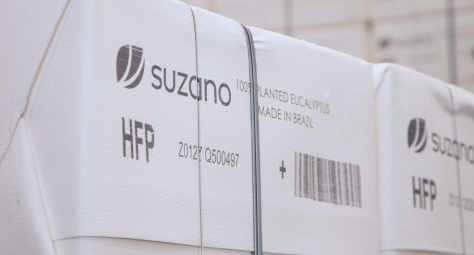sobre o que você deseja falar?


perguntas, sugestões ou problemas técnicos envolvendo a plataforma

informações sobre a empresa


Suzano's supply chain is diverse and comprises suppliers segmented into macro-categories: operations, services, logistics, marketing, and sales, as well as support activities such as infrastructure and technological development. In 2024, we transacted with approximately 15,100 suppliers, of which 38,100 were in our database. Spending with suppliers was approximately 40.6 billion BRL.
Suppliers monitored by Purchasing
Below, we describe the processes and policies applied by the Responsible Supplier Management Program.
Governance
In 2021, we created the Responsible Supplier Management Program to closely manage our wide-ranging supply chain and integrate sustainability into our purchasing processes globally. This program has a team dedicated to monitoring and developing partners through policies, procedures, and controls to identify, assess, and mitigate their ESG risks. It is worth mentioning that a portion of buyers have their variable compensation linked to the engagement of suppliers in programs focused on Supply Chain Sustainability.
The ESG Supplier Program is overseen by executive leaders from the Sustainability and Purchasing areas, who deliberate quarterly on implementing ESG initiatives.
Suzano's purchasing guidelines, such as the Sustainable Purchasing Policy, are reviewed every 24 months to prevent possible violations of ESG requirements and ensure compliance with the Supplier Code of Conduct.
Hiring and approval
The approval and registration process covers 100% of suppliers and includes mandatory documentation according to the contracting segment. We incorporate sustainability requirements into this process, assessing mechanisms and strategies related to social management and performance, corporate governance, quality management systems, integrity, due diligence, and the environment.
To be contracted, suppliers must undergo a certification process to ensure compliance with established legal, technical, and compliance requirements. They also participate in the Procurement supplier management processes, which verify their compliance with the State, validate and manage licenses and mandatory documentation, conduct preliminary assessments of minimum quality and ESG requirements, collect market information and confirm adherence to the Supplier Code of Conduct.
To ensure compliance with the minimum ESG requirements, suppliers must complete a self-assessment including the following aspects:
The certification process also includes a background check on eligible suppliers. This process verifies information of various kinds (reputational, administrative, judicial, criminal and others) related to individuals and companies registered in Suzano's supplier database.
The background check reports contain information from different sources, including media and legal analyses on various ESG topics, such as compliance with environmental, labor, corruption, and criminal laws; ethics and integrity; financial, fiscal, and reputational status; and judicial and administrative proceedings. Depending on the supplier's score, the analyses are valid for 6 to 18 months.
Suppliers are excluded from contracting when there is an irregularity and/or failure in one of the stages of the certification processes, including not obtaining the minimum score required (over 30%) in any of the self-assessment questionnaires (quality, social, governance or environmental). The entire process is described in the Sustainable Purchasing Policy.
In 2024, 71.65% of suppliers were approved for environmental and 100% for social criteria. For more information, visit the indicator “Total number and percentage of new suppliers selected based on environmental and social criteria”.
Selection of critical suppliers
Below we describe the methodology for selecting critical and priority suppliers for participation in the risk management and supplier performance assessment processes. We consider critical suppliers to be those with commercial relevance and:
To classify suppliers according to their sustainability risk, Suzano uses the Supply Chain Social and Environmental Risk Matrix, which allows us to establish consistent ESG monitoring criteria in line with our Commitments to Renew Life (CPRVs) and the United Nations (UN) Sustainable Development Goals (SDGs).
To build the Social and Environmental Risk Matrix, the company's entire supplier base is segmented according to the sector in which the companies operate, considering social, environmental, and governance aspects. Those belonging to industries with a high level of severity and probability of socio-environmental impact and a high level of co-responsibility on the part of Suzano are classified as having a high sustainability risk.
The company considers ESG a decisive supplier evaluation and selection matrix factor. This means that when suppliers are on a level playing field, the company will prefer the one that is best positioned in terms of sustainability.
Risk management
e continued the second-party external auditing of high-risk suppliers from a socio-environmental perspective, which began in 2022. The process considered the suppliers prioritized for the first cycle of the initiative. Among our audited suppliers, 77% were still monitored through the Reprisk platform. Reprisk also provides supplier ratings [RepRisk Rating (RRR)], which consider company-specific ESG risks and industry-specific ESG risks at a national level.
All audited suppliers must submit corrective action plans within 15 days of the publication of the results, addressing the issues identified. Corrective measures must be implemented within 90 days by suppliers who did not pass our assessment, within a year by suppliers approved with restrictions, and within a year and a half by approved suppliers. The auditing company and Suzano continue to monitor and support the supplier throughout the implementation process.
Another important initiative carried out by Suzano with its critical suppliers is the SSOMAR (Occupational Health, Safety and Environment) assessment, which monitors the risks of child labor and forced and/or compulsory labor in the company's operations.
The Health, Safety, and Quality of Life team (SSQV) also conducts quarterly housing inspections of all suppliers that have housing to serve Suzano's operations.
We have made progress in risk management processes with the establishment of the Proactive Supplier Risk Committee to discuss and determine Suzano's actions to mitigate the risks mapped in critical cases of human rights violations involving suppliers. The Committee comprises Procurement, Legal, Institutional Sustainability, Corporate Risks, and other areas invited as appropriate.
Throughout 2024, we structured the ESG Consequence Matrix, which was applied in cases of deviations, irregularities, and/or illegalities practiced within or outside the scope of the contract. The Matrix is made up of a decision tree integrated with the other supplier risk management processes and details which situations are considered deviations, their seriousness and relevance, and the possible consequences to be applied to suppliers, such as notifications, fines, action plans, etc. based on the severity and significance of the violation.
Supplier performance evaluation
The Supplier Performance Index (SPI) program evaluates critical suppliers regarding quality, environment, social and safety requirements. In 2024, we had an average approval rate of 98.9%. For suppliers that fall below the desired index, Suzano's contract managers develop corrective and improvement plans and monitor and support the implementation of corrective actions. Failure to comply with the planned actions can result in the supplier being blocked, suspended, or disqualified from our database.
Supplier ESG engagement and development programs
As part of our commitment to supporting and empowering our suppliers, we have implemented several projects to increase the engagement of our supply chain in ESG issues.
The Semear project carried out in partnership with Sebrae, a private organization that promotes entrepreneurship in Brazil, is a support program that lasts between 6 and 12 months and focuses on training and improving the ESG performance of Suzano's micro and small suppliers. They learn about best practices in management and innovation and legal, social, and environmental responsibility principles. We also created a version of the program focused on female entrepreneurship, including socially vulnerable women living in communities around Suzano's sites in Brazil.
The Climate Change in the Value Chain and Caring for Water in the Value Chain programs aim to encourage suppliers to commit to reducing greenhouse gas emissions and improving water management. To facilitate this, we have partnered with the Carbon Disclosure Project (CDP) to engage and support our suppliers in measuring, making data transparent, setting targets, and assessing risks and opportunities related to climate change and water use.
We also help expand knowledge on the subject throughout the value chain through training programs, workshops, and webinars held by CDP and Suzano. Cyclical meetings are held through CDP to share best practices, allowing our suppliers to have ESG benchmarks. The suppliers selected to participate in these programs have the most significant commercial relevance for the company, among those identified as high risk in the "Greenhouse Gas Emissions" and "Water and Effluents" hotspots by the Social and Environmental Risk Matrix.
In 2024, we invited 200 suppliers to report their climate information, and 80% of them participated in the program. On the subject of water security, 100 suppliers were invited, and 90% of them participated in the program.
Another ESG program offered by Suzano to suppliers is Inclusive Purchasing, which is designed to engage and motivate our supply chain to promote diversity, equity, and inclusion. To do this, we identify and facilitate diversity initiatives throughout our supply chain, including, for example, conducting a Diversity and Inclusion Census among our suppliers.
One of the highlights of this project is our partnership with JSL, a Brazilian logistics services company, in the Women in Driving initiative, which trains women to operate forklifts at Suzano sites in Brazil. Based on the project's results, we held meetings to share best practices with suppliers from different purchasing categories and developed new projects.
In 2024, we also signed a new partnership with WEConnect International. This global network connects companies owned by women with large organizations worldwide to increase the diversity of Suzano's supply chain. With the support of WEConnect, we organize events and training sessions for buyers and suppliers. In addition, we have improved our indicator for miscellaneous purchases, allowing us to identify our spending on miscellaneous suppliers more precisely.
We also promote supplier engagement events, such as Suzano Valoriza, a program created to recognize our suppliers based on their performance and ESG indexes.
Internal engagement
In addition to working on supplier development, the Responsible Supplier Management Program offers training on ESG issues for the company's buyers. For example, in 2024, the following training courses were offered:
Implementing technologies
We have evolved in the automation and analysis of data to improve risk prediction processes, make supply chain audits more efficient, and support decision-making for more responsible purchases. To this end, we have signed and maintained important partnerships, including those with the Linkana and RepRisk platforms, to support us on this journey of transformation.
Wood suppliers
The supply of wood, assessed from an environmental, social and economic perspective, is defined in the Social and Environmental Risk Matrix as critical and of high sustainability risk (Sustainable Purchasing Policy). As an additional risk assessment methodology, we use internationally recognized certification standards and regulations, such as the FSC® standards, the National Risk Analysis for Brazil, the European Timber Regulation (EUTR) and the United Kingdom Timber Regulation (UKTR), which are covered in the Wood Supply Policy.
The monitoring processes and risk mitigation are detailed in the indicator “Total number and percentage of suppliers that have undergone environmental and social assessment”.
Committed to sustainability practices in the supply chain, Suzano encourages its wood suppliers to seek FSC® and/or PEFC Forest Management certification. To guarantee the responsible origin of wood from partners who do not participate in the forest management certification program, we apply a Due Diligence System/Monitoring Program based on the company's Wood Procurement Policy, international regulations and FSC® and PEFC Controlled Wood/Controlled Sources standards.
Due diligence consists of risk assessment and mitigation in the supply chain and verifying compliance with environmental, social, legal, and labor requirements in first—and second-party audits and third-party audits carried out by independent bodies. This practice includes direct and indirect wood suppliers who carry out harvesting and transportation.
The following information is available in the tables below:
| 2020 | 2021 | 2022 | 2023 | 2024 | |
|---|---|---|---|---|---|
| número total | número total | número total | número total | número total | |
|
Total number of critical suppliers (monitored by Purchasing) |
458 |
410 |
696 |
719 |
701 |
|
Total number of critical suppliers (wood suppliers) |
n/d |
853 |
1.218 |
981 |
958 |
|
Total critical suppliers (tier 1 and non-tier 1) evaluated (monitored by Purchasing) |
n/d |
375 |
696 |
719 |
701 |
|
Total critical suppliers (tier 1 and non-tier 1) assessed (wood suppliers) |
n/d |
853 |
1.218 |
981 |
958 |
|
Total critical suppliers with high sustainability risk assessed (monitored by Purchasing) |
n/d |
702 |
533 |
521 |
603 |
|
Total suppliers with high sustainability risk assessed (wood suppliers) |
n/d |
853 |
1.218 |
981 |
958 |
| 2020 | 2021 | 2022 | 2023 | 2024 | |
|---|---|---|---|---|---|
| % | % | % | % | % | |
|
Percentage of critical suppliers (in relation to total suppliers) - monitored by Purchasing |
4,00% |
3,00% |
5,00% |
5,00% |
5,00% |
|
Percentage of critical suppliers (in relation to total suppliers) - wood suppliers¹ |
100,00% |
100,00% |
100,00% |
100,00% |
100,00% |
|
Percentage of total purchases spent with critical suppliers - monitored by Purchasing |
41,00% |
37,00% |
37,00% |
37,00% |
41,00% |
|
Percentage of total purchases spent with critical suppliers - wood suppliers¹ |
100,00% |
100,00% |
100,00% |
100,00% |
100,00% |
| 2022 | 2023 | 2024 | |||||||||||||
|---|---|---|---|---|---|---|---|---|---|---|---|---|---|---|---|
| Total number of suppliers tier 1 | Total number of significant suppliers (tier 1 and non-tier 1) | Total number of significant suppliers in tier 1 | Total number of significant suppliers in non-tier 1 | % of total spend with significant tier 1 suppliers | Total number of suppliers tier 1 | Total number of significant suppliers (tier 1 and non-tier 1) | Total number of significant suppliers in tier 1 | Total number of significant suppliers in non-tier 1 | % of total spend with significant tier-1 suppliers | Total number of suppliers tier 1 | Total number of significant suppliers (tier 1 and non-tier 1) | Total number of significant suppliers in tier 1 | Total number of significant suppliers in non-tier 1 | % of total spend with significant tier-1 suppliers | |
| número total | número total | número total | número total | % | número total | número total | número total | número total | % | número total | número total | número total | número total | % | |
|
Wood suppliers |
878 |
1.218 |
878 |
340 |
100,00% |
664 |
981 |
664 |
317 |
100,00% |
634 |
958 |
634 |
324 |
100,00% |
|
Suppliers monitored by Purchasing |
12.722 |
696 |
696 |
0 |
37,00% |
14.008 |
719 |
719 |
0 |
37,00% |
15.123 |
701 |
701 |
0 |
41,00% |
|
Total |
13.600 |
1.914 |
1.574 |
340 |
38,91% |
14.672 |
1.700 |
1.383 |
317 |
40,00% |
15.757 |
1.659 |
1.335 |
324 |
44,00% |
Suppliers monitored by Procurement
Given Suzano's different businesses, we have implemented the Socio-environmental Risk Matrix, which allows us to define consistent monitoring criteria in line with the company's Commitments to Renew Life. This guarantees risk mitigation from registration through monitoring and performance evaluation per the Sustainable Purchasing Policy and the Supplier Code of Conduct.
Wood suppliers
Suzano's wood supply areas, including those of suppliers (tier-1 and non-tier 1), are monitored based on environmental, social, economic, and legal requirements. To this end, we have adopted the Wood Supply Policy and the Deforestation Policy, the development of which complies with the Brazilian Forest Code, the criteria of the FSC® Association Policy, the FSC® and PEFC Forest Management and Chain of Custody standards, FSC® Controlled Wood, PEFC Controlled Sources, the European Timber Regulation (EUTR), the United Kingdom Timber Regulation (UKTR), the Lacey Act (United States), the Australian Illegal Logging Prohibition Act and the Fundamental Principles of the International Labor Organization (ILO).
Additionally, Suzano is aware of the European Deforestation Free Regulation (EUDR) and is committed to complying with the legislation to the best of its knowledge and ability. We emphasize that, before and regardless of this regulation, specific requirements such as no deforestation, due diligence, and traceability are practices already established by Suzano.